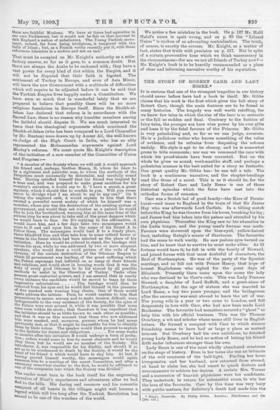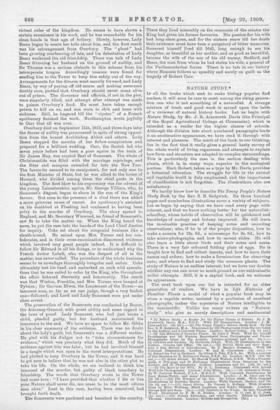THE STORY OF ROBERT CARR AND LADY ESSEX.*
Is is curious that one of the strangest tragedies in our history should never before have had a book to itself. Mr. Gibbs claims that his work is the first which gives the full story of Robert Carr, though the main featurei are to be found in many histories. The tragedy was well worth retelling, for we know few tales in which the rise of the hero is so meteoric or the fall so sudden and final. Contrary to the fashion of fairy-tales, the younger son here wins power by his own gifts and loses it by the fatal favours of the Princess. Mr. Gibbs is very painstaking and, so far as we can judge, accurate. He is a judicious writer who knows something of the value of evidence, and he refrains from deepening the colours unduly. His style is apt to be clumsy, and he is somewhat prone to trite comments; nor can we commend the care with which his proof-sheets have been corrected. But on the whole he gives us soured, workmanlike stuff, and perhaps a pedestrian manner is the best suited for a story so fantastic. One great quality Mr. Gibbs has : he can tell a tale. The book is a continuous narrative, and the chapter-headings read like those of a novel. This is as it should be, for the story of Robert Carr and Lady Essex is one of those historical episodes which the fates have cast into the orthodox forms of romance.
Carr was a Scotch lad of good family—the Kers of Ferule-
burst—and came to England. in the train of that Sir James Hay who was afterwards Lord Carlisle. In a tilting match' before the King he was thrown from his horse, breaking his leg; and James had him taken into the palace and attended by his own physician. Thereafter the King saw to his education in the Latin tongue, and the young man's fortune was made. Favours were showered upon the blue-eyed, yellow-haired Soot, including Ralegh's manor of Sherborne. The favourite had the sense to walk warily. He saw jealous eyes turned on him, and be knew that to survive he must make allies. As ill fortune would have it, he fell in with the family of Howard, and joined forces with that most doubtful of characters, the Earl of Northampton. He was of the party of the Spanish marriage, and so fell out with Prince Henry, that hope of honest Englishmen who sighed for the great days of Elizabeth. Presently there came upon the scone the lady who was destined to be Carr's ruin. This was Lady Frances Howard, a daughter of Lord Suffolk, and a great-niece of Northampton. At the age of sixteen she was married to Lord Essex; a boy two years younger, and the bridegroom after the ceremony was sent abroad to learn the art of war. The young wife in a year or two came to London, and fell desperately in love with Carr, who had now been made Lord Rochester. The favourite had meantime secured a " ghost " to help him with his official business. This was Sir Thomas Overbury, a wit and scholar whose name still lives in English letters. He formed a compact with Carr in which sincere friendship seems to have had as large a place as mutual interest. But Overbury had his own ambitions, he detested young Lady Essex, and he had no notion of letting his friend
drift under influences stronger than his own. Lady Essex is one of the most wholly abandoned creatures on the stage of history. Even in her teens she was an intimate of the evil creatures of the half-light. Finding her lover irresponsive, and her husband, now returned from abroad, at hand to claim her, she had resort to quack doctors and necromancers to achieve her desires. A certain Mrs. Turner and a succession of knavish physicians were her confidants. They undertook, in return for substantial sums, to win her the love of the favourite. Carr by this time was very busy with public matters, for Salisbury's death had made hint the
" King's Favourite. By Philip Gibbs. London : Hutchinson and Co. [16s. not. j
virtual ruler of the kingdom. He seems to have shown a certain conscience in his work, and he was remarkable for his clean hands in that age of bribery. Slowly, however, Lady Essex began to weave her toils about him, and the first result was his estrangement from Overbury. The "ghost" bad been growing overbearing of late, and his detestation of Lady Essex weakened the old friendship. There was talk of Lady Essex divorcing her husband on the ground of nullity, and Sir Thomas was a serious obstacle to this scheme from his intemperate tongue. Accordingly reasons were found for sending him to the Tower to keep him safely out of the way. Arrangements for the divorce went merrily forward, and Lady Essex, by way of paying off old scores and making assurance doubly sure, plotted that Overbury should never come alive out of prison. The Governor and officials, if not in the plot, were singularly blind, and attempt after attempt was made to poison Overbury's food. He must have taken enough poison to kill an ox, and was worn to skin and bone with sickness. Still, he lingered till the " elyster" of a French apothecary finished the work. Northampton wrote joyfully to Carr that all was over.
Overbury died on September 15th, 1613, and three days later the decree of nullity was pronounced in spite of strong opposi- tion from the honest Archbishop Abbot and others. Lady Essex stopped the mouths of her fellow-conspirators and prepared for a brilliant wedding. Carr, the Scotch lad who seven years before had been a poor squire in the train of Sir James Hay, was created Earl of Somerset. The whole of Christmastide was filled with the marriage rejoicings, and the fetes and masques extended far into the New Year. The favourite seemed to be omnipotent, for not only was ho the first Minister of State, but he was allied to the house of Howard, who divided among them the chief posts in the kingdom. The first blow to his supremacy was the advent of the young Leicestershire squire, Mr. George Villiers, who, to Somerset's disgust, began to share in the sun of the King's favour. But soon to the presence of a rival there was added a more grievous cause of unrest. An apothecary's assistant on his deathbed at Flushing had confessed to having been privy to the murder of Overbury. The story spread to England, and Mr. Secretary Winwood, no friend of Somerset's, saw fit to take the matter up. When the King heard the news, he put the case into the hands of the Lord Chief Justice for inquiry. Coke sot about the congenial business like a sleuth-hound. He seized upon Mrs. Turner and her con- federates, and in their cross-examination discovered evidence which involved very great people indeed. It is difficult to follow Sir Edward in all his doings, or to understand why the French doctor Lobel], who was the deepest of all in the matter, was never called. The procedure of the whole business seems to us nowadays thoroughly irregular and unfair. Coke ultimately lost his head, and embarked on such wild specula- tions that be was called to order by the King, who throughout the affair behaved disceetly and honourably. The result was that Weston, Franklin, and Mrs. Turner were hanged at Tyburn ; Sir Gervase Elwin, the Lieutenant of the Tower—an innocent man, so far as we can judge, though a very foolish one—followed; and Lord and Lady Somerset were put under close arrest.
The prosecution of the Somersets was conducted by Bacon, the Attorney-General, with great ability and some regard to the laws of proof. Lady Somerset, who had just borne a child, pleaded guilty, but her husband maintained his innocence to the end. We have no space to follow Mr. Gibbs in his clear summary of the evidence. There was no doubt about the lady's guilt, but Somerset's was a different matter.
He pled with his Judges not to " take circumstances for evidence," which was precisely what they did. Much of the evidence against him was false ; but he had involved himself in a tangle which was open to the worst interpretations. He had plotted to keep Overbury in the Tower, and it was hard to get men to believe that he was not also in the other plot to take hie life. On the whole, we are inclined to think him innocent of the murder, but guilty of black treachery to friendship. The words that Overbury wrote in the Tower had come true : "I have provided that whether I die or live your Nature shall never die, nor cease to be the most odious Man alive." Lust in this case, having been conceived, had brought forth death.
The Somersets were pardoned and banished to the country.
There they lived miserably on the remnants of the estates the King had given hie former favourite. His passion for his wife had long since gone, and for the sixteen years till her death their existence must have been a purgatory of bitter memories. Somerset himself lived till 1645, long enough to see his daughter, as beautiful as her mother, and as good as beautiful, become the wife of the son of his old enemy, Bedford, and Essex, the man from whom he had stolen his wife, a general of the Parliamentarian forces. There is no tale in our history where Nemesis follows so speedily and surely on guilt as the tragedy of Robert Carr.







































 Previous page
Previous page